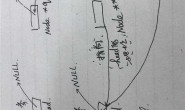使用VS2010 建立了MFC,然后用类向导调入了一个类型库,是个DLL的组件接口
然后我在cpp中include了生产的.h文件,编译
就提示:
1>d:\openfristcard\openfristcard\release\taxcardx.tlh(414): error C2556: “_bstr_t IGoldTax::GetInfo(void)”: 重载函数与“HRESULT IGoldTax::GetInfo(void)”只是在返回类型上不同
1> d:\openfristcard\openfristcard\release\taxcardx.tlh(210) : 参见“IGoldTax::GetInfo”的声明
1>d:\openfristcard\openfristcard\release\taxcardx.tlh(414): error C2371: “IGoldTax::GetInfo”: 重定义;不同的基类型
1> d:\openfristcard\openfristcard\release\taxcardx.tlh(210) : 参见“IGoldTax::GetInfo”的声明
1>d:\openfristcard\openfristcard\release\taxcardx.tlh(210): error C3803: “_bstr_t IGoldTax::Info”: 属性的类型与它的访问器之一“HRESULT IGoldTax::GetInfo(void)”不兼容
1> d:\openfristcard\openfristcard\release\taxcardx.tlh(202) : 参见“IGoldTax::Info”的声明
1> d:\openfristcard\openfristcard\release\taxcardx.tlh(210) : 参见“IGoldTax::GetInfo”的声明
1>d:\openfristcard\openfristcard\release\taxcardx.tli(919): error C2556: “_bstr_t IGoldTax::GetInfo(void)”: 重载函数与“HRESULT IGoldTax::GetInfo(void)”只是在返回类型上不同
1> d:\openfristcard\openfristcard\release\taxcardx.tlh(210) : 参见“IGoldTax::GetInfo”的声明
1>d:\openfristcard\openfristcard\release\taxcardx.tli(919): error C2371: “IGoldTax::GetInfo”: 重定义;不同的基类型
1> d:\openfristcard\openfristcard\release\taxcardx.tlh(210) : 参见“IGoldTax::GetInfo”的声明
1>d:\openfristcard\openfristcard\release\taxcardx.tli(919): error C2084: 函数“HRESULT IGoldTax::GetInfo(void)”已有主体
1> d:\openfristcard\openfristcard\release\taxcardx.tlh(210) : 参见“GetInfo”的前一个定义
—
让我很疑惑,因为是调用的组件接口,似乎改也没法改,求各位大牛帮助。第一次发帖什么都不懂
然后我在cpp中include了生产的.h文件,编译
就提示:
1>d:\openfristcard\openfristcard\release\taxcardx.tlh(414): error C2556: “_bstr_t IGoldTax::GetInfo(void)”: 重载函数与“HRESULT IGoldTax::GetInfo(void)”只是在返回类型上不同
1> d:\openfristcard\openfristcard\release\taxcardx.tlh(210) : 参见“IGoldTax::GetInfo”的声明
1>d:\openfristcard\openfristcard\release\taxcardx.tlh(414): error C2371: “IGoldTax::GetInfo”: 重定义;不同的基类型
1> d:\openfristcard\openfristcard\release\taxcardx.tlh(210) : 参见“IGoldTax::GetInfo”的声明
1>d:\openfristcard\openfristcard\release\taxcardx.tlh(210): error C3803: “_bstr_t IGoldTax::Info”: 属性的类型与它的访问器之一“HRESULT IGoldTax::GetInfo(void)”不兼容
1> d:\openfristcard\openfristcard\release\taxcardx.tlh(202) : 参见“IGoldTax::Info”的声明
1> d:\openfristcard\openfristcard\release\taxcardx.tlh(210) : 参见“IGoldTax::GetInfo”的声明
1>d:\openfristcard\openfristcard\release\taxcardx.tli(919): error C2556: “_bstr_t IGoldTax::GetInfo(void)”: 重载函数与“HRESULT IGoldTax::GetInfo(void)”只是在返回类型上不同
1> d:\openfristcard\openfristcard\release\taxcardx.tlh(210) : 参见“IGoldTax::GetInfo”的声明
1>d:\openfristcard\openfristcard\release\taxcardx.tli(919): error C2371: “IGoldTax::GetInfo”: 重定义;不同的基类型
1> d:\openfristcard\openfristcard\release\taxcardx.tlh(210) : 参见“IGoldTax::GetInfo”的声明
1>d:\openfristcard\openfristcard\release\taxcardx.tli(919): error C2084: 函数“HRESULT IGoldTax::GetInfo(void)”已有主体
1> d:\openfristcard\openfristcard\release\taxcardx.tlh(210) : 参见“GetInfo”的前一个定义
—
让我很疑惑,因为是调用的组件接口,似乎改也没法改,求各位大牛帮助。第一次发帖什么都不懂
解决方案:10分
如果DLL没错误的话,看起来像是缺少什么宏控制。具体还要看代码
你把 taxcardx.tlh 的 414行上下10行以及210行上下10行,贴出来看看
你把 taxcardx.tlh 的 414行上下10行以及210行上下10行,贴出来看看
解决方案:10分
像方法“GetInfo ”的声明和实现各有两份,仅返回值不同,这种情况是不被允许的。不知道你用的是谁提供的DLL
解决方案:20分
MSDN98_1.ISO http://pan.baidu.com/s/1dDF41ix, MSDN98_2.ISO http://pan.baidu.com/s/1bnGo0Vl
先下载安装MSDN98
然后参考:
COM Tutorial Samples
Tutorial Home
Using Samples
First Lesson
List of Lessons
Click a lesson link below to jump to the tutorial narrative for the associated code sample.
Directory/Sample Lesson Topic
APPUTIL Lesson 0 Win32 Basics: Win32 Application Utility Library
READTUT Lesson 1 Win32 Basics: Tutorial Reader and Linking to APPUTIL
EXESKEL Lesson 2 Win32 Basics: Win32 EXE Skeleton Application
DLLSKEL Lesson 3 Win32 Basics: Win32 DLL Skeleton
DLLUSER Lesson 4 Win32 Basics: EXE User of a DLL
COMOBJ Lesson 5 COM Objects: Containment and Aggregation in a DLL
COMUSER Lesson 6 COM Objects: Nested Aggregation in an EXE User
REGISTER Lesson 7 COM Components: Component Object Registration
DLLSERVE Lesson 8 COM Components: Component Object DLL Server
DLLCLIEN Lesson 9 COM Components: Client Application of DLL Server
LICSERVE Lesson 10 COM Components: DLL Licensed Server
LICCLIEN Lesson 11 COM Components: Client Application of Licensed Server
MARSHAL Lesson 12 COM Components: Custom Interface Standard Marshaling
MARSHAL2 Lesson 13 COM Components: Marshaling DLL Self-Registration
LOCSERVE Lesson 14 COM Components: Local Server
LOCCLIEN Lesson 15 COM Components: Client Application of Local Server
APTSERVE Lesson 16 COM Components: Local Server with Multiple Apartments
APTCLIEN Lesson 17 COM Components: Client of Multiple Apartment Server
REMCLIEN Lesson 18 COM Components: Distributed COM (DCOM) Remote Client
FRESERVE Lesson 19 COM Components: Free-threaded Server
FRECLIEN Lesson 20 COM Components: Client of Free-threaded Server
CONSERVE Lesson 21 COM Components: Connectable Object Server
CONCLIEN Lesson 22 COM Components: Client of Connectable Object Server
STOSERVE Lesson 23 COM Components: Structured Storage Server
STOCLIEN Lesson 24 COM Components: Client of Structured Storage Server
PERSERVE Lesson 25 COM Components: IPersistStream Persistent Object Server
PERTEXT Lesson 26 COM Components: IPersistStreamInit Persistent Object Server
PERDRAW Lesson 27 COM Components: IPersistStorage Persistent Object Server
PERCLIEN Lesson 28 COM Components: Client of Persistent Object Servers
DCDMARSH Lesson 29 COM Components: Standard Marshaling for DCOM
DCDSERVE Lesson 30 COM Components: DCOM Server Using Security
DCOMDRAW Lesson 31 COM Components: DCOM Client Using Security
INC — Common include directory used by the code samples
LIB — Common library directory used by the code samples
TUTSAMP — Main branch directory with TUTORIAL.EXE, MAKEALL.BAT, etc.
Throughout the sample sequence a clear differentiation is maintained between client and server, with a separate lesson sample for each. Usually, each client/server pair covers an area of COM technology. Here is an overview of the technologies covered by the lessons.
Basic Win32 application programming is covered in the APPUTIL, READTUT, EXESKEL, DLLSKEL, and DLLUSER lessons. APPUTIL provides a utility framework for building Win32 applications. It also contains some tools needed for tutorial purposes. READTUT is a very simple EXE application that shows how to link to the APPUTIL static library and call utility functions in it. READTUT also shows how to invoke the COM tutorial Web page reader that is used throughout the sample series. EXESKEL shows a basic Win32 skeleton EXE application built using APPUTIL. DLLSKEL and DLLUSER simularly show a basic Win32 DLL (Dynamic Link Library) skeleton and how to access it from an EXE user application.
Basic COM object construction, custom interfaces, and techniques for coding their reuse using aggregation and containment are covered in COMOBJ and COMUSER. The implementation and use of the standard IUnknown interface is covered. The implementation and use of the custom ICar, IUtility, and ICruise interfaces is covered.
Basic COM component construction, class factories, component object registration, and techniques for housing COM objects in COM component servers are covered in REGISTER, DLLSERVE, and DLLCLIEN. The implementation and use of the standard IClassFactory interface is covered.
COM component Licensing is covered in LICSERVE and LICCLIEN. The implementation and use of the standard IClassFactory2 interface is covered.
Out-of-Process local servers and the standard marshaling of custom interfaces are covered in MARSHAL, LOCSERVE, and LOCCLIEN. Explicit self-registration in the standard marshaling DLL is covered in MARSHAL2. The use of the MIDL language to specify custom interfaces is covered. The use of the MIDL compiler to produce proxy/stub marshaling servers is also covered.
Apartment model server and client construction are covered in APTSERVE and APTCLIEN. Construction of multiple single-threaded apartments (STAs) in the same process is covered.
DCOM (Distributed COM) with custom interfaces operating between client and server across machine boundaries is covered in REMCLIEN. Specifying the remote machine name in the COSERVERINFO structure is covered. Detailed DCOM security issues are not covered.
Free-threaded COM components and their access by free-threaded clients are covered in FRESERVE and FRECLIEN. The use of several client worker threads in the multi-threaded apartment (MTA) is covered. The implementation and use of a custom IBall interface is covered.
Connectable COM object technology is covered in CONSERVE and CONCLIEN. Event source and sink construction is covered. Implementation and use of the IConnectionPointContainer, IConnectionPoint, IEnumConnectionPoints, and IEnumConnections standard interfaces are covered. The implementation and use of the custom IBall and IBallSink interfaces is covered.
Structured storage using COM””s compound file technology is covered in STOSERVE and STOCLIEN. A COM-based scribble drawing application is used. Use of the IStorage and IStream standard interfaces is covered. The implementation and use of the custom IPaper and IPaperSink interfaces is covered.
Persistent COM objects are covered in PERSERVE, PERTEXT, PERDRAW, and PERCLIEN. IPersistStream is covered in the PERSERVE components. IPersistStreamInit is covered in the PERTEXT components. IPersistStorage is covered in the PERDRAW components. The PERCLIEN client functions these various persistent objects and manages storage for all of them in various substorages and streams within one structured storage compound file. The implementation and use of the custom IPageList, ITextPage, IDrawPage, IPageListSink, ITextPageSink, and IDrawPageSink interfaces is covered.
DCOM (Distributed COM) Security is covered in DCDMARSH, DCDSERVE, and DCOMDRAW. The use of CoInitializeSecurity is shown in the DCDSERVE and DCOMDRAW samples. Multiple clients accessing a shared single COM object across machine boundaries is shown in a simple network shared-drawing application. Process and activation security within NT network domains is discussed. Registry AppIDs and their LaunchPermission, AccessPermission, and RunAs named values are discussed. The use of the DCOMCNFG utility is covered.
Back to page top
先下载安装MSDN98
然后参考:
COM Tutorial Samples
Tutorial Home
Using Samples
First Lesson
List of Lessons
Click a lesson link below to jump to the tutorial narrative for the associated code sample.
Directory/Sample Lesson Topic
APPUTIL Lesson 0 Win32 Basics: Win32 Application Utility Library
READTUT Lesson 1 Win32 Basics: Tutorial Reader and Linking to APPUTIL
EXESKEL Lesson 2 Win32 Basics: Win32 EXE Skeleton Application
DLLSKEL Lesson 3 Win32 Basics: Win32 DLL Skeleton
DLLUSER Lesson 4 Win32 Basics: EXE User of a DLL
COMOBJ Lesson 5 COM Objects: Containment and Aggregation in a DLL
COMUSER Lesson 6 COM Objects: Nested Aggregation in an EXE User
REGISTER Lesson 7 COM Components: Component Object Registration
DLLSERVE Lesson 8 COM Components: Component Object DLL Server
DLLCLIEN Lesson 9 COM Components: Client Application of DLL Server
LICSERVE Lesson 10 COM Components: DLL Licensed Server
LICCLIEN Lesson 11 COM Components: Client Application of Licensed Server
MARSHAL Lesson 12 COM Components: Custom Interface Standard Marshaling
MARSHAL2 Lesson 13 COM Components: Marshaling DLL Self-Registration
LOCSERVE Lesson 14 COM Components: Local Server
LOCCLIEN Lesson 15 COM Components: Client Application of Local Server
APTSERVE Lesson 16 COM Components: Local Server with Multiple Apartments
APTCLIEN Lesson 17 COM Components: Client of Multiple Apartment Server
REMCLIEN Lesson 18 COM Components: Distributed COM (DCOM) Remote Client
FRESERVE Lesson 19 COM Components: Free-threaded Server
FRECLIEN Lesson 20 COM Components: Client of Free-threaded Server
CONSERVE Lesson 21 COM Components: Connectable Object Server
CONCLIEN Lesson 22 COM Components: Client of Connectable Object Server
STOSERVE Lesson 23 COM Components: Structured Storage Server
STOCLIEN Lesson 24 COM Components: Client of Structured Storage Server
PERSERVE Lesson 25 COM Components: IPersistStream Persistent Object Server
PERTEXT Lesson 26 COM Components: IPersistStreamInit Persistent Object Server
PERDRAW Lesson 27 COM Components: IPersistStorage Persistent Object Server
PERCLIEN Lesson 28 COM Components: Client of Persistent Object Servers
DCDMARSH Lesson 29 COM Components: Standard Marshaling for DCOM
DCDSERVE Lesson 30 COM Components: DCOM Server Using Security
DCOMDRAW Lesson 31 COM Components: DCOM Client Using Security
INC — Common include directory used by the code samples
LIB — Common library directory used by the code samples
TUTSAMP — Main branch directory with TUTORIAL.EXE, MAKEALL.BAT, etc.
Throughout the sample sequence a clear differentiation is maintained between client and server, with a separate lesson sample for each. Usually, each client/server pair covers an area of COM technology. Here is an overview of the technologies covered by the lessons.
Basic Win32 application programming is covered in the APPUTIL, READTUT, EXESKEL, DLLSKEL, and DLLUSER lessons. APPUTIL provides a utility framework for building Win32 applications. It also contains some tools needed for tutorial purposes. READTUT is a very simple EXE application that shows how to link to the APPUTIL static library and call utility functions in it. READTUT also shows how to invoke the COM tutorial Web page reader that is used throughout the sample series. EXESKEL shows a basic Win32 skeleton EXE application built using APPUTIL. DLLSKEL and DLLUSER simularly show a basic Win32 DLL (Dynamic Link Library) skeleton and how to access it from an EXE user application.
Basic COM object construction, custom interfaces, and techniques for coding their reuse using aggregation and containment are covered in COMOBJ and COMUSER. The implementation and use of the standard IUnknown interface is covered. The implementation and use of the custom ICar, IUtility, and ICruise interfaces is covered.
Basic COM component construction, class factories, component object registration, and techniques for housing COM objects in COM component servers are covered in REGISTER, DLLSERVE, and DLLCLIEN. The implementation and use of the standard IClassFactory interface is covered.
COM component Licensing is covered in LICSERVE and LICCLIEN. The implementation and use of the standard IClassFactory2 interface is covered.
Out-of-Process local servers and the standard marshaling of custom interfaces are covered in MARSHAL, LOCSERVE, and LOCCLIEN. Explicit self-registration in the standard marshaling DLL is covered in MARSHAL2. The use of the MIDL language to specify custom interfaces is covered. The use of the MIDL compiler to produce proxy/stub marshaling servers is also covered.
Apartment model server and client construction are covered in APTSERVE and APTCLIEN. Construction of multiple single-threaded apartments (STAs) in the same process is covered.
DCOM (Distributed COM) with custom interfaces operating between client and server across machine boundaries is covered in REMCLIEN. Specifying the remote machine name in the COSERVERINFO structure is covered. Detailed DCOM security issues are not covered.
Free-threaded COM components and their access by free-threaded clients are covered in FRESERVE and FRECLIEN. The use of several client worker threads in the multi-threaded apartment (MTA) is covered. The implementation and use of a custom IBall interface is covered.
Connectable COM object technology is covered in CONSERVE and CONCLIEN. Event source and sink construction is covered. Implementation and use of the IConnectionPointContainer, IConnectionPoint, IEnumConnectionPoints, and IEnumConnections standard interfaces are covered. The implementation and use of the custom IBall and IBallSink interfaces is covered.
Structured storage using COM””s compound file technology is covered in STOSERVE and STOCLIEN. A COM-based scribble drawing application is used. Use of the IStorage and IStream standard interfaces is covered. The implementation and use of the custom IPaper and IPaperSink interfaces is covered.
Persistent COM objects are covered in PERSERVE, PERTEXT, PERDRAW, and PERCLIEN. IPersistStream is covered in the PERSERVE components. IPersistStreamInit is covered in the PERTEXT components. IPersistStorage is covered in the PERDRAW components. The PERCLIEN client functions these various persistent objects and manages storage for all of them in various substorages and streams within one structured storage compound file. The implementation and use of the custom IPageList, ITextPage, IDrawPage, IPageListSink, ITextPageSink, and IDrawPageSink interfaces is covered.
DCOM (Distributed COM) Security is covered in DCDMARSH, DCDSERVE, and DCOMDRAW. The use of CoInitializeSecurity is shown in the DCDSERVE and DCOMDRAW samples. Multiple clients accessing a shared single COM object across machine boundaries is shown in a simple network shared-drawing application. Process and activation security within NT network domains is discussed. Registry AppIDs and their LaunchPermission, AccessPermission, and RunAs named values are discussed. The use of the DCOMCNFG utility is covered.
Back to page top
© 1995-1998 Microsoft Corporation




